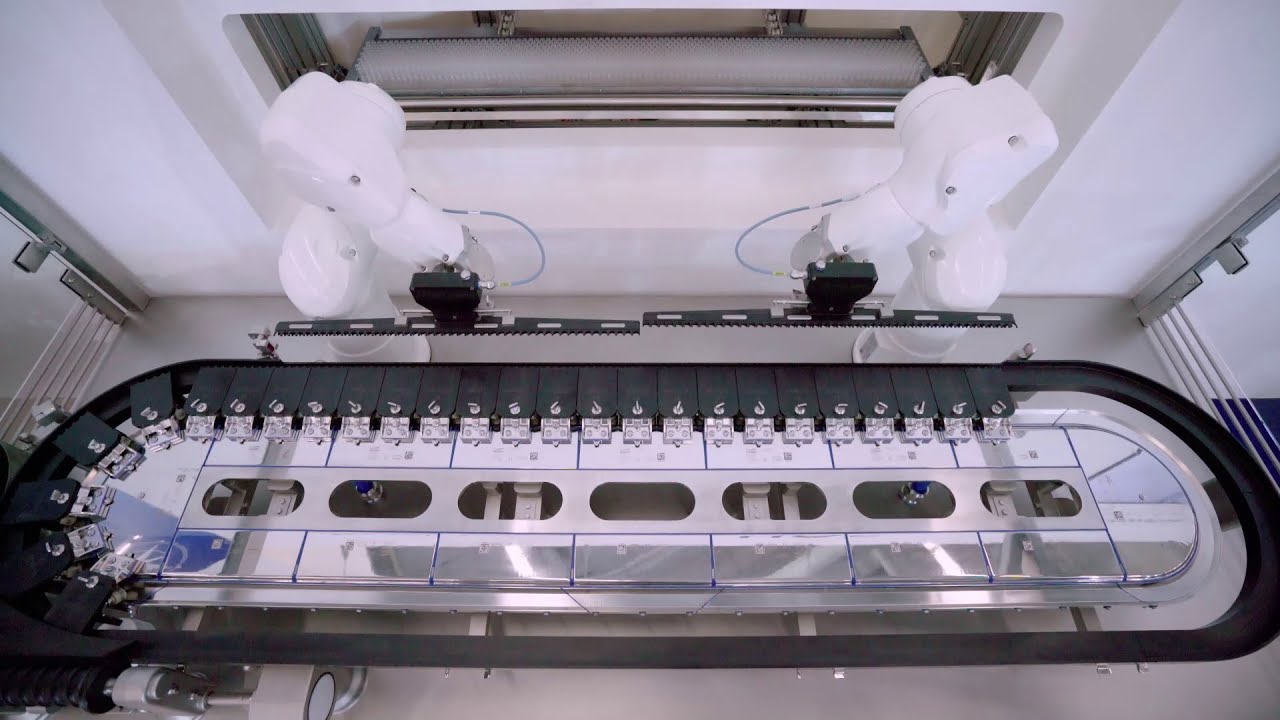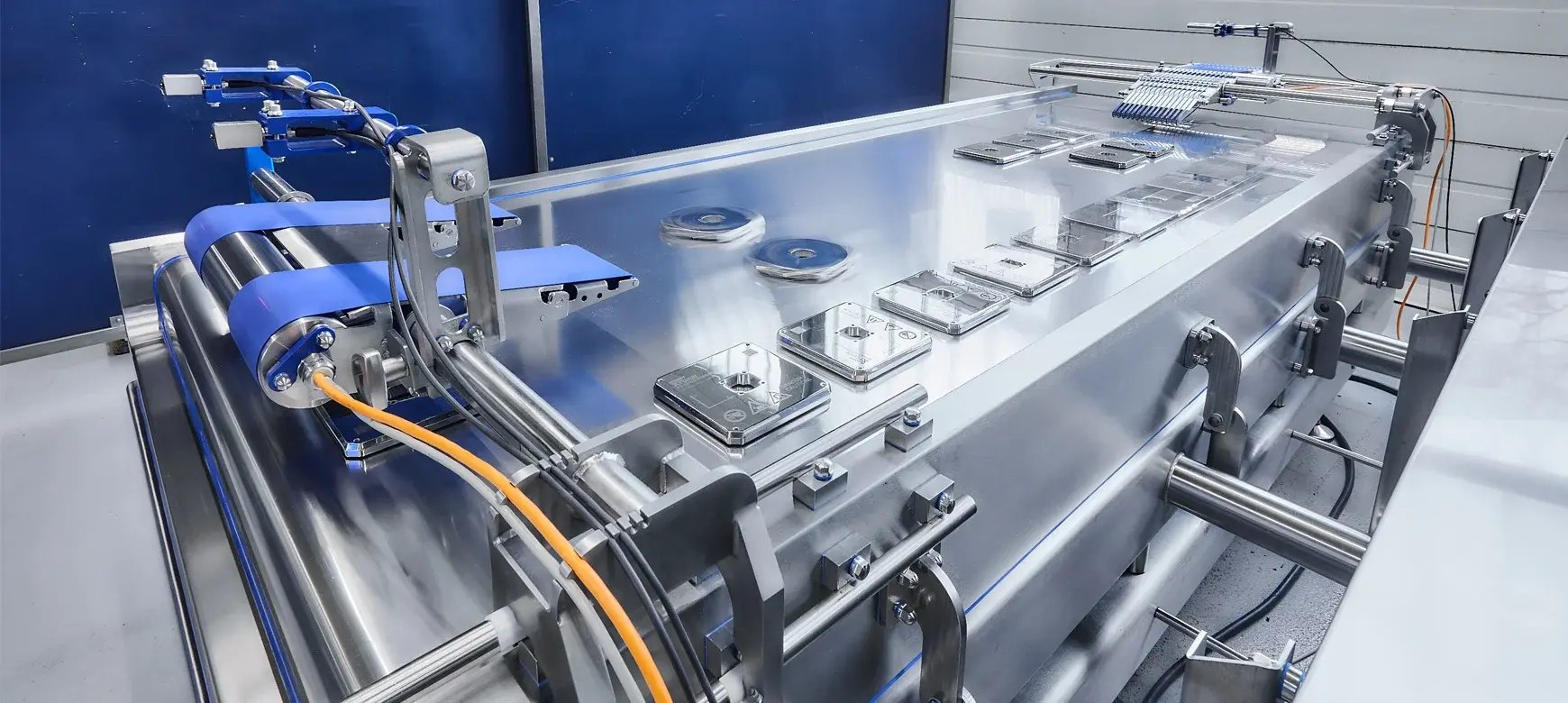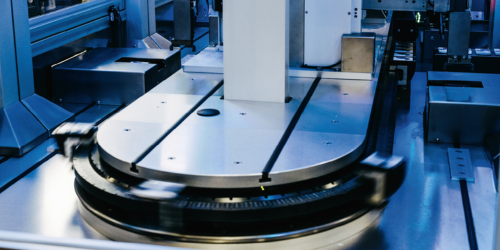With rising competition, a global skills gap, and the need for more adaptable machinery and production processes, traditional manufacturing approaches are increasingly falling short. In order to survive (and thrive), forward-thinking OEMs are rethinking their approach to manufacturing, opting for more agile, software-driven solutions that can enable them to pace with the market.
In this article, we’ll take a look at how Beckhoff’s cutting-edge intelligent transportation systems offer a way forward, empowering manufacturers to navigate the complexities of modern production demands with confidence.
Key takeaways:
- Manufacturing is increasingly shifting towards agile, software-driven solutions to address rising competition, labour shortages, and the need for adaptable machinery.
- The industry faces a growing skills gap, with estimates that the U.S. sector could have 2.1 million unfilled jobs by 2030.
- Beckhoff's intelligent transportation systems provide scalable and flexible solutions that allow for rapid reconfiguration and integration, enabling manufacturers to respond swiftly to market demands while minimizing downtime.
How industrial manufacturing is evolving
The need for and adoption of advanced technology and machinery is ushering in an evolution in the global manufacturing market, leading to a rising need for flexibility.
Manufacturers increasingly need to respond swiftly to changing market demands and product variants, driving a growing need for agility and efficiency. Many major manufacturers are already investing in technologies and infrastructure that enhance flexibility and support agile manufacturing practices.
Nestlé recently invested $41.3 million to expand its ice cream factory in London, Ontario, boosting capabilities and efficiency, allowing Nestlé to meet rising consumer demands while maintaining competitive pricing. This focus on innovation and efficiency positions it well against competitors in the food industry, particularly as it shifts towards higher-margin sectors like plant-based products.
Similarly, Ford Motor Co. is investing $1.8 billion to transform its assembly complex in Oakville, Ontario into an electric vehicle production hub. This transformation includes:
-
- A new 407,000 square-foot on-site battery plant for assembling battery packs
- Repurposing and transforming existing buildings into a state-of-the-art facility
- Leveraging a skilled and experienced workforce to adapt to new technologies
-
- Vertical integration of battery and vehicle assembly processes
- Efficient production of next-generation electric vehicles starting in 2025
- Balancing investments in future technologies with immediate market demands
Growing labour shortages and skills gaps
As manufacturing technology advances, the industry faces a widening skills gap that impacts productivity and growth. A report by Deloitte and The Manufacturing Institute estimates that, without intervention, the U.S. manufacturing sector could have 2.1 million unfilled jobs by 2030. While some positions have been recovered, 570,000 remain unfilled, with approximately half a million current openings in the sector.
Deloitte also shared a survey by the National Association of Manufacturers’ (NAM) that found that 65% of respondents felt that attracting and retaining talent was the primary business challenge for the first quarter of 2024, with executives in the manufacturing sector reporting that finding suitable talent is now 36% more difficult than in 2018.
Risk aversion to new technologies
According to an analysis by McKinsey, the pace of change in manufacturing is accelerating, driven by "technology disruptions and macrotrends such as reshoring, a global skilled labor shortage, and environmental, social, and governance (ESG) efforts." The analysis suggests that many advanced manufacturing technologies, including digital twins, self-teaching robots, and self-programming devices, will be commonplace in the near future.
Canadian OEMs, however, tend to be more cautious than their U.S. counterparts. According to Statistics Canada, only 2% of Canadian enterprises in manufacturing have adopted robotics technologies. IBM's Global AI Adoption Index 2023 also found that only 37% of large Canadian enterprises have actively deployed AI in their business operations, with limited AI skills and expertise, data complexity, and high costs listed as main barriers.
This hesitancy can delay the implementation of solutions that offer significant efficiency gains and future-proofing. As the market evolves, the willingness to adopt innovative technologies will likely determine which companies maintain a competitive edge.
Overcoming key manufacturing challenges with Beckhoff’s intelligent transportation systems
Beckhoff's software-driven automation solutions that include mechatronic transportation systems are revolutionizing manufacturing processes in a number of ways:
Increasing scalability to reduce costs
Beckhoff's intelligent transportation systems eliminate the need for extensive hardware upgrades by enabling scalability through software-driven control. This approach enables OEMs to adapt and expand their systems while minimizing capital expenditures and downtime.
Beckhoff’s eXtended Transportation System (XTS) linear transport system exemplifies this scalability through its modular design, which enables quick assembly and effortless reconfiguration, with options for both straight and curved motor modules. The system eliminates the need for traditional stop gates and locate units through servo motor control, while seamless integration with TwinCAT 3 automation software and EtherCAT network ensures streamlined operation.
A real-world example of its impact comes from Schubert Pharma, a Germany-based company specializing in turnkey packaging lines and engineering consulting services. The company implemented the XTS system in their pharmaceutical packaging operations, where it efficiently moves vials and ampoules from labeling to cartoning machines while maintaining the strict product safety requirements essential in pharmaceutical manufacturing. The system's intelligent movers ensure rapid, precise product transport without glass-to-glass contact.
When confronted with a facility column obstruction, Schubert Pharma leveraged the XTS system's flexible design to create an L-shaped configuration—optimizing floor space while maintaining performance. The implementation was accelerated by two key features:
- A simulation function for optimizing parameters before deployment
- Pre-assembled, tested function modules for rapid integration
Enhancing flexibility to minimize downtime and speed up product introductions
Modern manufacturers face increasing pressure to manage diverse products and meet rapid market demands. Beckhoff's intelligent mechatronic transportation systems—XTS and XPlanar—are designed to meet these challenges with modular designs and advanced motion control.
The XTS allows precise control of individual movers, enabling rapid reconfiguration, on-the-fly adjustments, and seamless start-stop capabilities without line interruptions. Operators can synchronize movements, adjust product groupings, and efficiently integrate external processes.
This flexibility extends across various applications, from intralogistics and packaging to lab automation and electronics testing. The XTS's dynamic spacing adjustment capabilities between products then further optimize process flow, while its ability to synchronize with external processes enables complex workflows with coordinated actions.

XPlanar further enhances flexibility with its floating transport system, offering six degrees of freedom. With the ability to lift products up to 5 mm above the tiles, movers can spin, pitch, and yaw, enabling complex product movements and handling. This design allows movers to bypass each other, enabling parallel processing and independent paths, which is essential in high-demand sectors like pharmaceuticals, where quick changeovers and precise handling are crucial. The system's hygienic design and contactless motion make it particularly valuable for sensitive environments requiring clean, precise operations.

For a recent example of the effectiveness of these technologies, consider HOF Sonderanlagenbau, a company specializing in customized automation solutions. They utilized the XTS Hygienic system—a stainless steel variant tailored for pharmaceutical production—as the core of a new transport solution. Specifically engineered for use within an isolator—a controlled environment—and compatible with hydrogen peroxide cleaning, it ensures high sanitation standards while adapting quickly to different operational requirements.
Optimizing space with compact design
In modern manufacturing facilities, where every square foot counts, space optimization is critical for maintaining competitiveness. Beckhoff's intelligent transportation systems tackle this challenge with innovative designs that significantly reduce machine footprints while enhancing operational capabilities.
The XPlanar system exemplifies this approach, offering six degrees of freedom and allowing complex product movements without the space demands of conventional conveyor systems. This advantage is evident in Provisur Technologies' implementation for sliced food handling.
At Provisur's facility, their Free Movement System (FMS), built with XPlanar technology, dramatically reduced space requirements compared to traditional systems. Key innovations include:
- Integrating control tech beneath stainless-steel worktops
- Removing modules needed for turning and buffering functions
- Reducing conveyor belt structures by nearly 90%
- Using 48 modular tiles for flexible mover configuration

This compact system maintains high output, handles various product portions, and enables tasks like turning and merging streams—all in a much smaller footprint. Additional benefits include easier cleaning, silent operation, reduced maintenance, and enhanced operational efficiency, making space optimization a key competitive asset.
Integrated automation to lower costs
Beckhoff’s automation systems integrate multiple processes into a single, streamlined solution, significantly reducing operational complexity and costs. This efficiency shines in our I/O terminal production facility, where 10,000 terminals are produced per shift, with a fully tested terminal exiting the system every three seconds.
This high throughput is achieved by integrating:
- Automated product identification through vision systems and DataMatrix codes
- Parallel programming and testing
- Integrated quality control with electrical and optical inspections
- Centralized control and monitoring
Bridging the skills gap
With the aforementioned labor shortages, addressing the skills gap is crucial. Beckhoff's TwinCAT 3 automation software tackles this challenge by supporting multiple programming languages, including:
- IEC 61131-3 standard languages
- Object-oriented programming
- Ability to interact with applications written in common languages like Python and C#
- Integration with Visual Studio
Driving manufacturing success with intelligent transportation systems
As manufacturing continues to evolve, the need for flexible, efficient, and future-ready solutions – exemplified by Beckhoff's innovative XTS and XPlanar systems – is becoming increasingly critical.
By combining innovative design with powerful software control, these systems provide the framework and the tools to adapt quickly to changing market demands, optimize production processes, and overcome common manufacturing challenges, including labor shortages and space limitations.
If you’re ready to explore how intelligent transportation systems can impact your business, contact Beckhoff today to learn more about these cutting-edge solutions.
Get started with Beckhoff’s intelligent transportation solutions
Get in touch to discuss your manufacturing goals and to learn more about Beckhoff’s innovative intelligent transportation solutions and expertise
.png?width=76&height=76&name=Untitled%20(100%20x%20100%20px).png)
%20(500%20x%20500%20px).png?width=700&height=700&name=Untitled%20(100%20x%20100%20px)%20(500%20x%20500%20px).png)


.png)
.png)